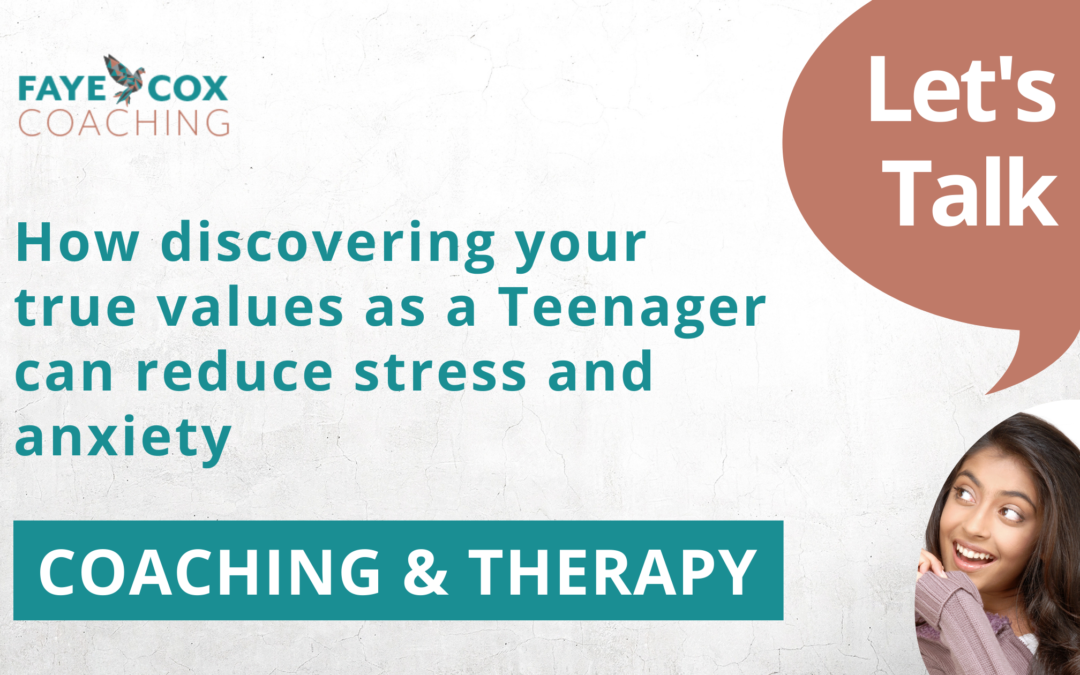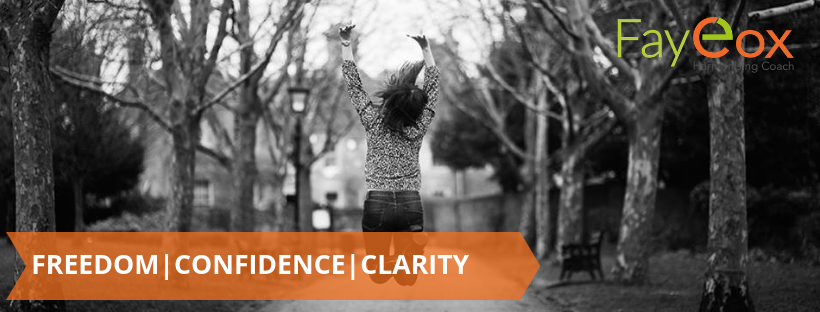
by Faye Cox | Feb 3, 2023 | Anxiety, Coaching, Family, Parents, Stress, Teens, Tips, Uncategorized, Wellbeing
What are Teenage Values and Beliefs?
As human beings, we all have our very own map of the world. No two people’s are ever the same. You can be an identical twin, yet your world map will still differ.

No other person has experienced life through your lens. No other person has seen, heard or felt things exactly the same way you have. This is hugely beneficial to learn as it can relieve the pressure of feeling like you have to be like other people.
Values
Values are the things that are important to you. I call these your non-negotiables in life. For example, my values are honesty, compassion, empathy and respect. I live by these values, and when I feel one of them is not being met either by myself or by those closest to me, it can cause stress and anxiety.
Beliefs
Beliefs are what you believe to be true about yourself and the world around you. These can be anything from thinking that you’re not good enough at something, not tall enough for something or even that you can’t do something for whatever reason you’ve convinced yourself is true.
When you’re a young child, your values and beliefs are automatically the same as those closest to you: your parents, older siblings, grandparents, etc. But when you reach your teenage years, your actual values can get lost and confused with other people’s. You can even begin to doubt your family values and believe other families’ values align with what you want to believe.
These beliefs may suit your current lifestyle more, or they might be more relaxed, and that’s okay. It’s completely normal to question what you believe to be true and what your parents believe to be true as long as you do it respectfully. Remember, your parents may have lived by these values for a long time and will be deeply embedded in their minds. For someone to come along and question them can feel difficult and uncomfortable and like someone is disrespecting them.

As with most parents, they may not even know why they have them in the first place, as they too will have inherited some of their beliefs from their parents a long time ago.
When I was a child, my parents firmly believed that drawing on anything apart from paper was wrong. I know this was to stop me from writing on the walls when I was a toddler. Your parents may have told you the same thing. As an adult, I can realise what this means. Still, as a young child, this became so embedded in my mind that I believed that I was never to draw on anything except paper.
When my children suggested that we draw a rainbow on the pavement for the NHS during COVID, my instant reply was ‘no’. To which they both asked me why. I gave them the old ‘because I said so’ answer and thought that would be the end of it. But then they asked me why it was so wrong and gave me two very valid reasons why it should be okay; one being that it was to show support for the NHS and the other that they could easily wash it off.
Well, what could I say? I had nothing; no comeback could back up this belief my parents had given me as a young child. I even asked myself why and to my amazement, I had no real reason. I had acted instantly and unconsciously due to something drummed into me as a child. I’m sure you can guess what happened next – I told them we could get some chalk and create our rainbow. Their faces were a picture, and our rainbow was the talk of the close and stayed put until the rain came and washed it all away a few days later.

Why am I telling you about my old belief and rainbows? I want you to know that even we adults have old and outdated beliefs that influence our decisions regarding our children. Be mindful of this when your parents question your reasons for doing something.
It means that you, too, can change your beliefs about yourself. You, too, can believe that you CAN do something, that you are good enough.
When it comes to many things in life, it’s a good idea to take a closer look at your values so that you can live authentically as you. It can be difficult with so many outside influences, especially friends, but it’s fundamental to discover who you are and who you want to be.
So, how do you go about discovering your teenage values? I do this with all the young people I work with, and here is an exercise you can complete to do just that.
Teenage Values exercise
- Write a list of everything important to you, eg. family, friendship, kindness, integrity, honesty, learning, money, success, well-being, giving back to the community, faith, and caring for yourself and others.
- Narrow down your list to your three most important ones.
- Write down why each of these three values is important to you.
- Write down who you know who shares all three values.
- Write down who you know who shares at least two of these values.
- Give an example of how you live by each of your chosen values.
If you’re not already living by these three values, how can you make the necessary changes to include these in your everyday life? Are you living by these values in some parts of your life and not others?
If like so many other teenagers I work with, you’re finding it difficult to know what you believe to be true or how to live authentically as you then check out my book ‘Making Sense of Me’ which is out now. Alternatively you can book a call with me

by Faye Cox | May 18, 2020 | Tips
Have you ever had a negative thought? Of course you have, we all have negative thoughts. We have between 50-70,000 thoughts each and every day. Have you ever uttered it out loud, even in jest? Of course you have. Negative thinking can be damaging not only to our self-esteem, but can begin a cycle of thought and behaviour which negatively impacts our own perception of events in our lives.
For example:
Perhaps you’ve been assigned a special project at work. You’re confident in taking it on, but upon completion you notice one tiny error. You begin to berate the way in which you handled the project, even though the error was not significant. While your boss is telling you what a great job you’ve done, you begin to make excuses for it. Your negativity has belittled the entire project, and magnified one area of it.
What steps can you take to avoid this pattern? Take a step back and look at the project objectively. Not only did you complete it in an efficient manner, but it will become the template for future projects. Forget about the mistake; think about what you’ve achieved. Focus on what went right, not what went wrong.
The holidays are approaching, and you need to begin cleaning the whole house ready. You look around and decide it’s just too much; you can’t do it; why bother. Stop! Take a deep breath and consider dividing up the tasks. Get your family involved to help by giving each one a specific job. Once you begin the process of prioritising, you will feel better and it will get done.
You’ve started a diet before your holiday. One day, you have a craving for a particular dessert. You quickly decide your diet is over, and it wasn’t worth the effort. You walk over to the mirror and utter to yourself, “I’m fat, and there’s nothing I can do about it.”
Wrong!
Setting yourself up for failure by thinking negatively about the way you look does not solve the immediate problem. Instead, admit to cheating; promise you’ll try harder, and allow positive thoughts to guide you through.
Improving your self-talk and re-framing your beliefs relating to it can help you think your way to a better you.
Once you discover the belief that is holding you back you can start to challenge and re-frame it.
Here are some questions you can ask yourself to challenge that belief
- Why do I believe this is true?
- Where did these beliefs come from?
- What is it that’s holding me back from achieving success?
- What can I do to change it?
Re-framing your thoughts in to positive ones is incredibly powerful and once you’ve cracked the habit of doing it, it becomes easier to catch those daily negative thoughts, stop them and give yourself a more positive thought in its place.
You can learn more about creating more positive thoughts in our Personal Transformation Mastery self-study course.
If you need any help creating better, healthier thoughts to move you towards success you can email me or take a look at the services we offer here. Using the FLOAT system we take our clients from Chaos to Calm in both life and business and help you to create the success you deserve.

by Faye Cox | Mar 16, 2020 | Uncategorized
Some people have a difficult time in managing their anxieties and fears. In addition, a person’s self-esteem and self-confidence can also suffer. As a result, here is a list of techniques a person can use to help manage their anxieties, fears, and self-esteem.
Remember that practice makes perfect. Whenever it comes to dealing with your anxieties or any other task; practice, patience, and persistence is the name of the game. If you don’t get the desired results the first time around, then keep trying until you do. Through practice, you will become better at the task at hand and your self-confidence will increase. This also applies to managing your anxieties.
In every anxiety-related situation you experience, begin to learn what works, what doesn’t work, and what you need to improve on in managing your fears and anxieties. For instance, you have a lot of anxiety and you decide to take a walk to help you feel better. The next time you feel anxious you can remind yourself that you got through it the last time by taking a walk. This will give you the confidence to manage your anxiety the next time around.
Sometimes, we can get anxious over a task that we will have to perform in the near future. When this happens, visualise yourself doing the task in your mind. For instance, you and your team have to play in the championship volleyball game in front of a large group of people in the next few days. Before the big day comes, imagine yourself playing the game in your mind. Imagine that you’re playing in front of a large audience. By playing the game in your mind, you will be better prepared to perform for real when the time comes. Self-Visualisation is a great way to reduce the fear and stress of a coming situation and increase your self-confidence.
Don’t forget to ask for help when needed. A person can only do so much. Asking for help can give us additional resources to help manage our fears and self-confidence. It is not always easy, however as humans, we thrive on being asked to help others and if you ask the right people it will lighten the load. Remember the old saying ‘a problem shared is a problem halved’.
Write down on a list everything that you are thankful for. Do not take anything for granted. The next time you feel down, take out your list and review everything that you have listed. This is a great way to remind us of what we have when we lose sight of the good things.
It can be difficult to manage our anxieties and self-esteem. If you are having trouble despite asking for help from friends and family etc. then talk to a professional who can help you manage your fears, anxieties and self-esteem. They will be able to provide you with additional advice, techniques, tools and insights on how to deal with your current problem. In the meantime, remember to take it one day at a time.
You can book a FREE 30 minute clarity call with me to see how I may be able to help

by Faye Cox | Jan 10, 2020 | Uncategorized
Self-confidence is important to all of us. In the stress literature, it’s one of the characteristics of the hardy professional, the professional that remains healthy in the face of the high stress of constant change. It’s important, but how do you build and maintain a viable and realistic self-confidence?
One way to look at self-worth is to see it as an inference from what you say to yourself privately about yourself. It’s estimated that you make between 300 to 400 self-evaluations per day. Unfortunately, for the majority of us, those evaluations are far from kind. Most major in self-criticism. Research suggests that for the average person 80% of their self evaluations are negative; only 20 percent are positive.
A good mistake can often be worth 45 minutes of self-whipping-“That was stupid. I can’t believe I said that. And they were all watching me. They’re probably going home tonight and talking about me!” If that’s not bad enough, we have an old file clerk in the back of our brain that responds to our attack and goes back to check the evidence-“Just a minute, boss. Let me check the ‘stupid’ file here. Why yes, you are stupid! In fact, you’re getting worse. This reminds me of the time you…” Most of us are good at making ourselves feel worse, not better.
Even when you do give yourself the luxury of feeling good about something you did, it seldom lasts long. We discount our successes-“I was lucky!” “It’s about time; I should’ve done this weeks ago!” “They could’ve done better!” When was the last time you lost sleep over a good day? Never!
Even though self-critical, we put our best foot forward publicly. We present ourselves as being 95% effective and admit making an occasional mistake to be human. You may fool others, but you don’t fool yourself. When you compare what you know about yourself with everyone else’s public image, you lose badly. When you major in the self-critical, you end up searching for loved ones, parents, friends, and bosses who will affirm you and make up for your own lack of self-esteem. Unfortunately, when you have to have the support of others, they control your confidence. By withholding approval they can leave you feeling less effective, less confident and more dependent.
You would not talk to others the way you talk to yourself! “You did that? You’re stupid! Did anyone see you? They saw you! Do they know I know you? I mean it reminds me of the time you….” Who needs friends like that! If a manager talked to an employee the way you talk to yourself, he could file a grievance and win. You deserve the same if not better treatment than what you would give a friend. Learn to make room for your mistakes as learning experiences.
Since mistakes are a part of life in the fast lane, we need to find ways to be self-critical without majoring in self-whipping. Start by looking at criticism as course-correction data that helps us get back on track in our journey to success. The goal is not conviction or blaming; it’s providing future-focused feedback that allows you to be more effective tomorrow!
Scott Adams, the Dilbert Cartoonist, put these insights into practice in dealing with a novice tennis partner: “Once at a tennis tournament, I was paired with a woman who had just learned how to play. Every time she missed a shot, she immediately turned to me, expecting that I would be disappointed or frustrated. Instead, I talked to her about our strategy for the next point. By doing so, I sent a very important message: The past doesn’t matter. I didn’t encourage her with empty praise-that rarely works. But I know that if she dwelled on a mistake, she was more likely to repeat it, and that if she focused on how we were going to win the next point, she was more likely to help us do just that. Over several days, her abilities improved dramatically and we ended up winning the tournament.”
Treat yourself the same way. Life is like a moving vehicle with no brakes. If you spend too much time in the rear-view mirror, you will hit a tree out the front window. In fact, that is why your rear-view mirror is smaller than your front window. Get out of your rear-view mirror and start focusing on driving to a desired future. Try letting go of the general self-attacks; use specific feedback. What did you do that you did not handle well?
Remember, it is easier to admit you made a mistake than to admit you are one. I’m not rude, but I’ve had moments of road rage that I’m not proud of. I know it wasn’t appreciated either; the other driver didn’t even wave with all his fingers!!
After identifying a specific mistake, focus on the future by asking two key questions: First, what can you do to rectify the problem? If any constructive action or apology could help rectify the problem, do just that. Secondly, and most importantly, how would you handle the same situation if it were to occur again? If you have a valued colleague or friend, use them as a sounding board. If not, write down your thoughts or use these questions to help focus your self-criticism. When you’ve learned from the past and focused on a new strategy, get back into the game of life.
Self-confidence begins when you can learn from errors, and then move beyond them to consistently improve. Welcome to the challenge of turning your mistakes into stepping stones to making change work for you. To really make a difference add the habit of ending the day by catching yourself being effective; use a journal to record at least 3 things you’re grateful for and 1 success. You may be winning and not know it if you’re not keeping score!
To find out more about how you can build your own self-confidence go to our website or find us on Facebook

by Faye Cox | Jan 6, 2020 | Tips
There are very few people who could call themselves perfect and be right. Most of us need to build self confidence today, but the majority just either ignore the issues or concentrate on the negatives: stress, worry, jobs, money problems and relationship issues. Concentrating on these areas drains our self confidence rather than improving it.
If you could improve your self confidence you could make more money, look and feel better physically, or just be more relaxed with other people. Below there are five simple techniques that have been proved to help build self confidence today.
1. Talk to yourself. It sounds crazy but it works. All of us have a running monologue constantly in our heads, whether we realize it or not. Everything we see, hear, or touch sparks off an immediate dialog in our thoughts.
For those who lack confidence this monologue is filled with negative messages many of which are the negative side of adverts from television, radio, advertisement boardings, newspapers, and just overhearing other people talk.
These negative thoughts literally suck energy from our minds and bodies and block the flow of positive messages. We need to hear the positive messages as they will build self confidence today and raise our self esteem. Take control. Use your inner thoughts to talk to yourself in a positive manner, as often as you can.
As an example one of my regular sayings is “I like myself, I like myself, I like myself”. I just repeat it for a couple of minutes. It sounds cheesy, but does build self confidence today – Try it. I bet that if you go to the mirror right now and repeat out loud “I like myself!” 50 times, it will be impossible to keep from smiling.
2. Dress as smartly and as classy as you can. You won’t feel at your best if you don’t look your best. You will be amazed at just how much more confidence you will have just looking your best. It just feels good when you are wearing your best clothes, are well groomed, and are surrounded by a clean environment. So what if it is Saturday, you need to build self confidence today not next week. Put on your nice clothes, get the car washed, style that hair! A hairdresser once told me “Everyday is show time!”. Forget about saving clothes for special occasions. I used to do this all the time and ended up never wearing half of my wardrobe for fear of spoiling it….what’s that all about. Every day is a special occasion, so get wearing those beautiful clothes you’ve never dared to wear!
3. Increase your self esteem even more by giving thanks to what you are, how you look, and what you are doing. Say “thank you” to yourself to everything you see, all whom you meet, and each smile that you receive.
4. Stand or sit correctly: How you stand sends out a message to the World, and in turn, back to you. This results in improving how you feel about yourself and will build self confidence today and every day.
There is scientific evidence that shows how posture affects our mood. Do not slouch. Slouching produces a down mood. By slouching you are telling the world and yourself it doesn’t matter, you don’t matter. Standing tall and upright will actually lift your mood. Help build up your confidence by pulling back those shoulders, stop that slouch, and walk proud.
5. Smile. Just smile and things seem better somehow. Practice smiling regularly and get your facial muscles used to the physical act of smiling.
Go to the mirror and smile – make yourself. Not a grimace, but a proper smile. If you don’t think you can try this:
- Open your eyes as wide as you can – (try and get your eyebrows right up to you hair line)
- Slightly open your mouth
- Pull the corners of your mouth back towards your ears (If your not sure pull them back with your fingers so you know what it feels like then try again without your fingers).
- Repeat 50 times. Get your facial muscles used to smiling and you will smile more and encourage smiles from others. This will make you feel happier and with that you’ll build self confidence today.
To find out more about how you can build your own self-confidence go to our website or find us on Facebook








